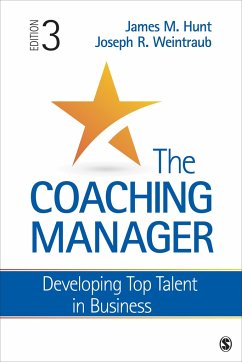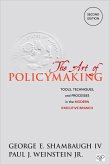- Broschiertes Buch
- Merkliste
- Auf die Merkliste
- Bewerten Bewerten
- Teilen
- Produkt teilen
- Produkterinnerung
- Produkterinnerung
This book provides students and managers alike with the guidance, tools, and examples needed to develop leadership talent and inspire performance.
Andere Kunden interessierten sich auch für
![The Political Speechwriter′s Companion The Political Speechwriter′s Companion]() Robert A. LehrmanThe Political Speechwriter′s Companion110,99 €
Robert A. LehrmanThe Political Speechwriter′s Companion110,99 €![Criminals in the Making Criminals in the Making]() John Paul WrightCriminals in the Making110,99 €
John Paul WrightCriminals in the Making110,99 €![Organization Design Organization Design]() Donald L. L. Anderson (USA University of Denver)Organization Design162,99 €
Donald L. L. Anderson (USA University of Denver)Organization Design162,99 €![Cases and Exercises in Organization Development & Change Cases and Exercises in Organization Development & Change]() Cases and Exercises in Organization Development & Change111,99 €
Cases and Exercises in Organization Development & Change111,99 €![The Art of Policymaking The Art of Policymaking]() George ShambaughThe Art of Policymaking80,99 €
George ShambaughThe Art of Policymaking80,99 €![Launching Successful Ventures Launching Successful Ventures]() Michael W. FountainLaunching Successful Ventures162,99 €
Michael W. FountainLaunching Successful Ventures162,99 €![The Global Environment The Global Environment]() The Global Environment110,99 €
The Global Environment110,99 €-
-
-
This book provides students and managers alike with the guidance, tools, and examples needed to develop leadership talent and inspire performance.
Hinweis: Dieser Artikel kann nur an eine deutsche Lieferadresse ausgeliefert werden.
Hinweis: Dieser Artikel kann nur an eine deutsche Lieferadresse ausgeliefert werden.
Produktdetails
- Produktdetails
- Verlag: SAGE Publications Inc
- 3 Revised edition
- Seitenzahl: 360
- Erscheinungstermin: 18. Mai 2016
- Englisch
- Abmessung: 228mm x 154mm x 22mm
- Gewicht: 490g
- ISBN-13: 9781483391656
- ISBN-10: 1483391655
- Artikelnr.: 41962593
- Herstellerkennzeichnung
- Libri GmbH
- Europaallee 1
- 36244 Bad Hersfeld
- gpsr@libri.de
- Verlag: SAGE Publications Inc
- 3 Revised edition
- Seitenzahl: 360
- Erscheinungstermin: 18. Mai 2016
- Englisch
- Abmessung: 228mm x 154mm x 22mm
- Gewicht: 490g
- ISBN-13: 9781483391656
- ISBN-10: 1483391655
- Artikelnr.: 41962593
- Herstellerkennzeichnung
- Libri GmbH
- Europaallee 1
- 36244 Bad Hersfeld
- gpsr@libri.de
Dr. James M. Hunt is an associate professor of management and former Chair of the Management Division at Babson College, in Wellesley, Massachusetts. There he teaches leadership, talent development and creativity. James has consulted to numerous business and health care organizations on the development of an organizational coaching capability, executive coaching, and talent development by managers. His current research is on the relationship between creativity, uncertainty and career development. He co-lead the design of Babson's innovative Talent Management course in the MBA Program and lead the redesign team for Babson's flagship course, Foundations of Management and Entrepreneurship. Formerly, he was faculty co-director of the Babson College Coaching for Leadership and Teamwork Program and a founder and former faculty co-director of the Babson Executive Education Coaching Inside the Organization program, designed for organizational development and human resource professionals. James is coauthor of the book The Coaching Organization: A Strategy for Developing Leaders, a groundbreaking study of best practice companies and coaching, published by Sage (2007). Dr. Hunt graduated from the Massachusetts Institute of Technology with a bachelor's of science degree and received a doctorate in business administration from Boston University Graduate School of Management, where he studied career and leadership development and work/life balance
Chapter 1: Whither the Coaching Manager
Coaching in an Uncertain World
The Coaching Manager Model and Developmental Coaching
Coaching and Learning
Why Don't More Managers Coach?
It's the Relationship That Matters
Coaching Isn't the Same as Mentoring
The Title of the Book Is The Coaching Manager
Chapter 2: The Coaching Manager Model-An Overview
Tonia and Ashok
Our Reactions to the Case
The Coaching Manager Model
A Coaching Culture
The Coaching Mindset
It's the Relationship that Makes it All Possible
The Coachee
The Opportunity
Reflection
Feedback
Follow Through and the Action Plan
As You Experiment With Coaching
Chapter 3: The Coaching Mindset
The Manager Who Learns to Coach
Can Anyone Learn to Coach?
The Characteristics of the Coaching Mindset
The Coaching Manager
Chapter 4: The Coachable "Coachee"
The Question of "Coachability"
What Do Employees Want From Their Managers?
Hallmarks of the Coachable Learner
The Problem of Impression Management
Barriers to Coaching: What Does an Apparent Lack of Coachability Look Like?
Arrogance: The Overestimator
An Apparent Lack of Interest in the Job
The Impact of Personal Stress
Diversity and Coachability
A Mismatch Between the Career Stage of the Employee and the Career Stage of
the Manager
Coachability: Treat Each Employee as an Individual
Chapter 5: The Coaching-Friendly Culture and the Coaching Relationship
The Coaching Friendly Culture
The Values and Practices of the Coaching-Friendly Culture
The Coaching Manager and Coachee Relationship
The Decision to Trust
Building Trust and a Coaching-Friendly Culture at the Team Level
The Coaching Relationship in a Diverse World
Cultural Intelligence
Protecting a Coach-Friendly Culture Over Time
Chapter 6: The Opportunity
Coaching Managers Focus on Running a Business
Not Just Results, Process: How the Work Gets Done
The Common Element in All Learning Opportunities
The Coachee's View of the Learning Opportunity
What Should the Coaching Manager Pay Attention to? Competence
Entrepreneurial Learning
Strengths or Weaknesses?
Opportunities: A Summary
Chapter 7: Reflection
What Do We Mean By Reflection?
Timing
Encouraging Reflection
Ask Reflective Questions, Listen for Understanding
On Learning to Ask Useful Questions
Helping the Employee Take Ownership
This Takes Time - And it Doesn't Get You There
Chapter 8: Feedback
Why are Performance Date, Even Observational Data, Suspect?
The Real Problem: Our Tendency to Draw Inferences From Selected Data
Error and Expectations: What You See Is What You Get
Getting the Most From Direct Observation and Related Approaches to
Gathering Performance Data
The Coachee's Role
The Coaching Manager as Observer: Promoting Learning and Performance, From
the Sidelines
Feedback and Coaching
The Benefits of Feedback
The Problem With Feedback
Making Feedback Useful - A Summary
The Basics of Providing Balanced Feedback
The Emotional Impact of Feedback
Maximizing the Value of That Imperfect Instrument, Feedback
Your Development as a Provider of Feedback
Chapter 9: Follow Through and Action Planning
Planned Development and Action Planning
Setting Goals
How People Change
Unfreezing
Change
Refreezing
Building Commitment for Learning and Change
Face-to-face Follow-up and More
Conclusions: Goal Setting and Follow Through
Chapter 10: Developmental Coaching and Performance Problems
Causes of Performance Problems
Poor Managers and Poorly Communicated Expectations
The Problem of Alignment
The Right Person in the Wrong Situation
Personal Problems
Character
Team Problems
Organizational Change
Addressing Performance Problems: Some Coaching Guidelines
Chapter 11: Coaching and Career Development
The Changing View of Careers and Career Development
Knowing What You Want
Developmental Coaching and Career Development
Learning Goals and Career Development
Who You Know Does Count: Networks, Supporters, and Blockers
Using Developmental Coaching to Address Career Concerns and Promote Career
Development
The Career Story
The Final Word, for Now
Chapter 12: Coaching and Management Education
The Nature of the Problem
Transfer of Learning
Making the Most of Learning in Management Education
Defining the Learning Goal
Choosing the Right Program
Following Up
Management Development Programs and the Coaching Manager
Chapter 13: Distance Coaching
Trust and the Virtual Team
What About Texting? Back to What Coaching is All About
Distance Coaching: A Summary of the Key Points
Chapter 14: Epilogue
Once Again, Technology
Changing Demographics
The Relationship Between the Manager and the Employee Is Still the Key
A Final Word for Our Coaches, Experienced and New
Coaching in an Uncertain World
The Coaching Manager Model and Developmental Coaching
Coaching and Learning
Why Don't More Managers Coach?
It's the Relationship That Matters
Coaching Isn't the Same as Mentoring
The Title of the Book Is The Coaching Manager
Chapter 2: The Coaching Manager Model-An Overview
Tonia and Ashok
Our Reactions to the Case
The Coaching Manager Model
A Coaching Culture
The Coaching Mindset
It's the Relationship that Makes it All Possible
The Coachee
The Opportunity
Reflection
Feedback
Follow Through and the Action Plan
As You Experiment With Coaching
Chapter 3: The Coaching Mindset
The Manager Who Learns to Coach
Can Anyone Learn to Coach?
The Characteristics of the Coaching Mindset
The Coaching Manager
Chapter 4: The Coachable "Coachee"
The Question of "Coachability"
What Do Employees Want From Their Managers?
Hallmarks of the Coachable Learner
The Problem of Impression Management
Barriers to Coaching: What Does an Apparent Lack of Coachability Look Like?
Arrogance: The Overestimator
An Apparent Lack of Interest in the Job
The Impact of Personal Stress
Diversity and Coachability
A Mismatch Between the Career Stage of the Employee and the Career Stage of
the Manager
Coachability: Treat Each Employee as an Individual
Chapter 5: The Coaching-Friendly Culture and the Coaching Relationship
The Coaching Friendly Culture
The Values and Practices of the Coaching-Friendly Culture
The Coaching Manager and Coachee Relationship
The Decision to Trust
Building Trust and a Coaching-Friendly Culture at the Team Level
The Coaching Relationship in a Diverse World
Cultural Intelligence
Protecting a Coach-Friendly Culture Over Time
Chapter 6: The Opportunity
Coaching Managers Focus on Running a Business
Not Just Results, Process: How the Work Gets Done
The Common Element in All Learning Opportunities
The Coachee's View of the Learning Opportunity
What Should the Coaching Manager Pay Attention to? Competence
Entrepreneurial Learning
Strengths or Weaknesses?
Opportunities: A Summary
Chapter 7: Reflection
What Do We Mean By Reflection?
Timing
Encouraging Reflection
Ask Reflective Questions, Listen for Understanding
On Learning to Ask Useful Questions
Helping the Employee Take Ownership
This Takes Time - And it Doesn't Get You There
Chapter 8: Feedback
Why are Performance Date, Even Observational Data, Suspect?
The Real Problem: Our Tendency to Draw Inferences From Selected Data
Error and Expectations: What You See Is What You Get
Getting the Most From Direct Observation and Related Approaches to
Gathering Performance Data
The Coachee's Role
The Coaching Manager as Observer: Promoting Learning and Performance, From
the Sidelines
Feedback and Coaching
The Benefits of Feedback
The Problem With Feedback
Making Feedback Useful - A Summary
The Basics of Providing Balanced Feedback
The Emotional Impact of Feedback
Maximizing the Value of That Imperfect Instrument, Feedback
Your Development as a Provider of Feedback
Chapter 9: Follow Through and Action Planning
Planned Development and Action Planning
Setting Goals
How People Change
Unfreezing
Change
Refreezing
Building Commitment for Learning and Change
Face-to-face Follow-up and More
Conclusions: Goal Setting and Follow Through
Chapter 10: Developmental Coaching and Performance Problems
Causes of Performance Problems
Poor Managers and Poorly Communicated Expectations
The Problem of Alignment
The Right Person in the Wrong Situation
Personal Problems
Character
Team Problems
Organizational Change
Addressing Performance Problems: Some Coaching Guidelines
Chapter 11: Coaching and Career Development
The Changing View of Careers and Career Development
Knowing What You Want
Developmental Coaching and Career Development
Learning Goals and Career Development
Who You Know Does Count: Networks, Supporters, and Blockers
Using Developmental Coaching to Address Career Concerns and Promote Career
Development
The Career Story
The Final Word, for Now
Chapter 12: Coaching and Management Education
The Nature of the Problem
Transfer of Learning
Making the Most of Learning in Management Education
Defining the Learning Goal
Choosing the Right Program
Following Up
Management Development Programs and the Coaching Manager
Chapter 13: Distance Coaching
Trust and the Virtual Team
What About Texting? Back to What Coaching is All About
Distance Coaching: A Summary of the Key Points
Chapter 14: Epilogue
Once Again, Technology
Changing Demographics
The Relationship Between the Manager and the Employee Is Still the Key
A Final Word for Our Coaches, Experienced and New
Chapter 1: Whither the Coaching Manager
Coaching in an Uncertain World
The Coaching Manager Model and Developmental Coaching
Coaching and Learning
Why Don't More Managers Coach?
It's the Relationship That Matters
Coaching Isn't the Same as Mentoring
The Title of the Book Is The Coaching Manager
Chapter 2: The Coaching Manager Model-An Overview
Tonia and Ashok
Our Reactions to the Case
The Coaching Manager Model
A Coaching Culture
The Coaching Mindset
It's the Relationship that Makes it All Possible
The Coachee
The Opportunity
Reflection
Feedback
Follow Through and the Action Plan
As You Experiment With Coaching
Chapter 3: The Coaching Mindset
The Manager Who Learns to Coach
Can Anyone Learn to Coach?
The Characteristics of the Coaching Mindset
The Coaching Manager
Chapter 4: The Coachable "Coachee"
The Question of "Coachability"
What Do Employees Want From Their Managers?
Hallmarks of the Coachable Learner
The Problem of Impression Management
Barriers to Coaching: What Does an Apparent Lack of Coachability Look Like?
Arrogance: The Overestimator
An Apparent Lack of Interest in the Job
The Impact of Personal Stress
Diversity and Coachability
A Mismatch Between the Career Stage of the Employee and the Career Stage of
the Manager
Coachability: Treat Each Employee as an Individual
Chapter 5: The Coaching-Friendly Culture and the Coaching Relationship
The Coaching Friendly Culture
The Values and Practices of the Coaching-Friendly Culture
The Coaching Manager and Coachee Relationship
The Decision to Trust
Building Trust and a Coaching-Friendly Culture at the Team Level
The Coaching Relationship in a Diverse World
Cultural Intelligence
Protecting a Coach-Friendly Culture Over Time
Chapter 6: The Opportunity
Coaching Managers Focus on Running a Business
Not Just Results, Process: How the Work Gets Done
The Common Element in All Learning Opportunities
The Coachee's View of the Learning Opportunity
What Should the Coaching Manager Pay Attention to? Competence
Entrepreneurial Learning
Strengths or Weaknesses?
Opportunities: A Summary
Chapter 7: Reflection
What Do We Mean By Reflection?
Timing
Encouraging Reflection
Ask Reflective Questions, Listen for Understanding
On Learning to Ask Useful Questions
Helping the Employee Take Ownership
This Takes Time - And it Doesn't Get You There
Chapter 8: Feedback
Why are Performance Date, Even Observational Data, Suspect?
The Real Problem: Our Tendency to Draw Inferences From Selected Data
Error and Expectations: What You See Is What You Get
Getting the Most From Direct Observation and Related Approaches to
Gathering Performance Data
The Coachee's Role
The Coaching Manager as Observer: Promoting Learning and Performance, From
the Sidelines
Feedback and Coaching
The Benefits of Feedback
The Problem With Feedback
Making Feedback Useful - A Summary
The Basics of Providing Balanced Feedback
The Emotional Impact of Feedback
Maximizing the Value of That Imperfect Instrument, Feedback
Your Development as a Provider of Feedback
Chapter 9: Follow Through and Action Planning
Planned Development and Action Planning
Setting Goals
How People Change
Unfreezing
Change
Refreezing
Building Commitment for Learning and Change
Face-to-face Follow-up and More
Conclusions: Goal Setting and Follow Through
Chapter 10: Developmental Coaching and Performance Problems
Causes of Performance Problems
Poor Managers and Poorly Communicated Expectations
The Problem of Alignment
The Right Person in the Wrong Situation
Personal Problems
Character
Team Problems
Organizational Change
Addressing Performance Problems: Some Coaching Guidelines
Chapter 11: Coaching and Career Development
The Changing View of Careers and Career Development
Knowing What You Want
Developmental Coaching and Career Development
Learning Goals and Career Development
Who You Know Does Count: Networks, Supporters, and Blockers
Using Developmental Coaching to Address Career Concerns and Promote Career
Development
The Career Story
The Final Word, for Now
Chapter 12: Coaching and Management Education
The Nature of the Problem
Transfer of Learning
Making the Most of Learning in Management Education
Defining the Learning Goal
Choosing the Right Program
Following Up
Management Development Programs and the Coaching Manager
Chapter 13: Distance Coaching
Trust and the Virtual Team
What About Texting? Back to What Coaching is All About
Distance Coaching: A Summary of the Key Points
Chapter 14: Epilogue
Once Again, Technology
Changing Demographics
The Relationship Between the Manager and the Employee Is Still the Key
A Final Word for Our Coaches, Experienced and New
Coaching in an Uncertain World
The Coaching Manager Model and Developmental Coaching
Coaching and Learning
Why Don't More Managers Coach?
It's the Relationship That Matters
Coaching Isn't the Same as Mentoring
The Title of the Book Is The Coaching Manager
Chapter 2: The Coaching Manager Model-An Overview
Tonia and Ashok
Our Reactions to the Case
The Coaching Manager Model
A Coaching Culture
The Coaching Mindset
It's the Relationship that Makes it All Possible
The Coachee
The Opportunity
Reflection
Feedback
Follow Through and the Action Plan
As You Experiment With Coaching
Chapter 3: The Coaching Mindset
The Manager Who Learns to Coach
Can Anyone Learn to Coach?
The Characteristics of the Coaching Mindset
The Coaching Manager
Chapter 4: The Coachable "Coachee"
The Question of "Coachability"
What Do Employees Want From Their Managers?
Hallmarks of the Coachable Learner
The Problem of Impression Management
Barriers to Coaching: What Does an Apparent Lack of Coachability Look Like?
Arrogance: The Overestimator
An Apparent Lack of Interest in the Job
The Impact of Personal Stress
Diversity and Coachability
A Mismatch Between the Career Stage of the Employee and the Career Stage of
the Manager
Coachability: Treat Each Employee as an Individual
Chapter 5: The Coaching-Friendly Culture and the Coaching Relationship
The Coaching Friendly Culture
The Values and Practices of the Coaching-Friendly Culture
The Coaching Manager and Coachee Relationship
The Decision to Trust
Building Trust and a Coaching-Friendly Culture at the Team Level
The Coaching Relationship in a Diverse World
Cultural Intelligence
Protecting a Coach-Friendly Culture Over Time
Chapter 6: The Opportunity
Coaching Managers Focus on Running a Business
Not Just Results, Process: How the Work Gets Done
The Common Element in All Learning Opportunities
The Coachee's View of the Learning Opportunity
What Should the Coaching Manager Pay Attention to? Competence
Entrepreneurial Learning
Strengths or Weaknesses?
Opportunities: A Summary
Chapter 7: Reflection
What Do We Mean By Reflection?
Timing
Encouraging Reflection
Ask Reflective Questions, Listen for Understanding
On Learning to Ask Useful Questions
Helping the Employee Take Ownership
This Takes Time - And it Doesn't Get You There
Chapter 8: Feedback
Why are Performance Date, Even Observational Data, Suspect?
The Real Problem: Our Tendency to Draw Inferences From Selected Data
Error and Expectations: What You See Is What You Get
Getting the Most From Direct Observation and Related Approaches to
Gathering Performance Data
The Coachee's Role
The Coaching Manager as Observer: Promoting Learning and Performance, From
the Sidelines
Feedback and Coaching
The Benefits of Feedback
The Problem With Feedback
Making Feedback Useful - A Summary
The Basics of Providing Balanced Feedback
The Emotional Impact of Feedback
Maximizing the Value of That Imperfect Instrument, Feedback
Your Development as a Provider of Feedback
Chapter 9: Follow Through and Action Planning
Planned Development and Action Planning
Setting Goals
How People Change
Unfreezing
Change
Refreezing
Building Commitment for Learning and Change
Face-to-face Follow-up and More
Conclusions: Goal Setting and Follow Through
Chapter 10: Developmental Coaching and Performance Problems
Causes of Performance Problems
Poor Managers and Poorly Communicated Expectations
The Problem of Alignment
The Right Person in the Wrong Situation
Personal Problems
Character
Team Problems
Organizational Change
Addressing Performance Problems: Some Coaching Guidelines
Chapter 11: Coaching and Career Development
The Changing View of Careers and Career Development
Knowing What You Want
Developmental Coaching and Career Development
Learning Goals and Career Development
Who You Know Does Count: Networks, Supporters, and Blockers
Using Developmental Coaching to Address Career Concerns and Promote Career
Development
The Career Story
The Final Word, for Now
Chapter 12: Coaching and Management Education
The Nature of the Problem
Transfer of Learning
Making the Most of Learning in Management Education
Defining the Learning Goal
Choosing the Right Program
Following Up
Management Development Programs and the Coaching Manager
Chapter 13: Distance Coaching
Trust and the Virtual Team
What About Texting? Back to What Coaching is All About
Distance Coaching: A Summary of the Key Points
Chapter 14: Epilogue
Once Again, Technology
Changing Demographics
The Relationship Between the Manager and the Employee Is Still the Key
A Final Word for Our Coaches, Experienced and New








